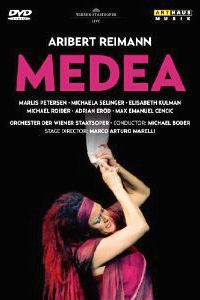In 2006, Aribert Reimann was offered a commission to create a new work for Vienna State Opera. After initial hesitation—”The creative process can sometimes be rather a struggle and isn’t necessarily a pleasant experience”—he went to work. After a flirtation with a Camus drama, he settled on Franz Grillparzer’s version of Medea as his subject matter.
Arthaus Musik has released a DVD of a live performance of this Medea, during its world premiere run in Vienna. A remarkable ensemble cast and brilliant stage direction by Marco Arturo Marelli bring this startling music drama to vivid life.
Reimann’s extremely dense score peers into the minds and emotions of its characters, and maintains a powerful dramatic tension throughout its 113 minutes of music. Those looking for tonal and melodic beauty will decidedly not find it here. There are absolutely no moments of repose in the score.
The DVD’s accompanying notes quote conductor Michael Boder: “It is all about deep seated insecurities, yawning abysses…Reimann has achieved this feeling of insecurity by creating fields of sound that have less to do with a regular beat than with song and breathing.” The music is unrelentingly unpleasant, but is absolutely brilliant in reflecting his troubled characters’ states of mind and feeling.
This production emphasizes Jason’s “vaulting amibition” as he gradually finds Medea an impediment to his personal and career advancement. The production gives a stark contrast between Kreon’s Corinth, a high-tech city that rises into the sky, and the desolate wasteland outside, looking much like a lunar landscape. Medea and her Colchian servant Gora are dressed in vibrant, messy, primitive reds and earth colors while the Corinth leaders are dressed in clean lines, all in pure white. This becomes particularly striking when Medea’s children change from Colchian garb into the “civilized” whites of Corinth.
The opera begins with Medea literally burying the artifacts of her mystical past, including the Golden Fleece, so that she and Jason might be acceptable to Kreon. It is immediately clear that Jason intends to find protection in Corinth whether Medea is accepted or not; this husband-wife conflict is palpable throughout the opera.
Jason is gradually seduced by Kreon’s daughter Kreusa, played splendidly as a slightly demented Barbie by Michaela Selinger. There is a wonderful scene in which Creusa, trying to find common ground with Medea, tries to teach her Corinthian civility with both a workout routine and harp lessons, at which Medea fails disastrously. The scene is both amusing and pathetic.
The most striking scene in the opera is the arrival of the Herald of the Amphyctions, who comes to demand that Kreon ban both Jason and Medea from the city’s protection. The Herald is sung by the astonishing countertenor Max Emanuel Cencic, in an otherworldly male soprano voice of power, beauty, and clarity. I have never heard a male singer produce this kind of sound. If you’ve never heard Cencic, you must. The scene becomes eerie, frightening, and deeply strange.
Soprano Marlis Peterson, a noted Lulu, is simply brilliant as Medea, both vocally and dramatically. The role gives new meaning to “high tessitura”, with much of the vocal writing in the highest and most emotional range. There are hair-raising leaps in pitch throughout, and the role demands an emotional and vocal intensity from which most singing actresses would shrink. Peterson has mastered this role completely, and never “lets the ball drop” in her searing intensity.
httpv://www.youtube.com/watch?v=OMdF8i8EBUU
The entire cast is excellent. Adrian Erod is a three-dimensional Jason; always clear in his character’s shifting intentions and singing with a variety of vocal choices. Michael Roider’s Kreon has its woofy moments, but we hear and see the King’s semi-paranoid behavior in protecting the city and helping his daughter to her desired husband. Mezzo Elisabeth Kulman is a potent Gora, producing torrents of powerful singing with clarity of tone and volume to spare.
I cannot imagine a more difficult score to conduct, but Boder has mastered it, drawing an emotional and precise reading from the Orchester der Weiner Staatsoper. From beginning to end, Boder assures his audience that he is in complete control of Reimann’s twisting, turning music.
I would urge those watching this DVD to give it time. It took me at least 15 minutes to accommodate myself to Reimann’s sometimes-cacophonic sounds. At first I thought, “OK, unrelentingly ugly attempt at being darker than Berg.” But soon, I was swept up in the drama and realized that the sounds were remarkably perceptive in expressing the inner workings of the characters’ minds. This is a work for those who love opera as theatre; those who love opera for scenic and melodic beauty would be wise to look elsewhere.




